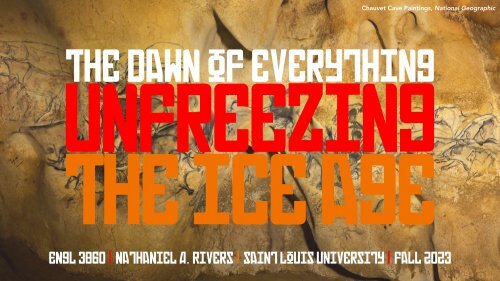ENGL 3860 Unfreezing the Ice Age
Chauvet Cave Paintings, National Geographic The dawn of everything Unfreezing The ice age ENGL 3860 | Nathaniel A. Rivers | saint louis university | fall 2023
- Page 2 and 3: For most of our evolutionary histor
- Page 4 and 5: What evolution might look like.
- Page 6 and 7: We have to picture our ancestors mo
- Page 8 and 9: Tomb of Isocrates, Athenian Orator,
- Page 10 and 11: [A]rchaeological evidence is piling
- Page 12 and 13: Experience Experiment
- Page 14: Perhaps all these questions blind u
Chauvet Cave Paintings, National Geographic<br />
The dawn of everything<br />
<strong>Unfreezing</strong><br />
The ice age<br />
<strong>ENGL</strong> <strong>3860</strong> | Nathaniel A. Rivers | saint louis university | fall 2023
For most of our evolutionary history, we did indeed live in Africa—but not<br />
just <strong>the</strong> eastern savannahs, as previously thought […] Some of those<br />
populations remained isolated from each ano<strong>the</strong>r for tens or even hundreds<br />
of thousands of years, cut off from <strong>the</strong>ir nearest relatives by deserts and<br />
rainforests. Strong regional traits developed. The result probably would<br />
have struck a modern observer as something more akin to a world<br />
inhabited by hobbits, giants and elves than anything we have direct<br />
experience of today, or in <strong>the</strong> more recent past. Those elements that make<br />
up modern humans—<strong>the</strong> relatively uniform “us” referred to above—<br />
seem only to have come toge<strong>the</strong>r quite late in <strong>the</strong> process.<br />
Graeber and Wengrow | The Dawn of Everything | 81
What evolution does not look like.
What evolution might look like.
They were far, far more physically diverse than<br />
humans are today; and presumably <strong>the</strong>ir social<br />
differences were even greater than <strong>the</strong>ir physical<br />
ones. In o<strong>the</strong>r words, <strong>the</strong>re is no ‘original’ form of<br />
human society.<br />
Graeber and Wengrow | The Dawn of Everything | 82
We have to picture our ancestors moving between relatively<br />
enclosed environments, dispersing and ga<strong>the</strong>ring, tracking <strong>the</strong><br />
seasonal movements of mammoth, bison and deer herds.<br />
While <strong>the</strong> absolute number of people may still have been<br />
startlingly small, <strong>the</strong> density of human interactions seems to<br />
have radically increased, especially at certain times of year.<br />
And with this came remarkable bursts of cultural expression.<br />
Graeber and Wengrow | The Dawn of Everything | 85
In conversation, we can hold thoughts and reflect on problems<br />
sometimes for hours on end. This is of course why so often, even if<br />
we’re trying to figure something out by ourselves, we imagine<br />
arguing with or explaining it to someone else. Human thought is<br />
inherently dialogic. Ancient philosophers tended to be keenly aware<br />
of all this: that’s why, whe<strong>the</strong>r <strong>the</strong>y were in China, India or Greece,<br />
<strong>the</strong>y tended to write <strong>the</strong>ir books in <strong>the</strong> form of dialogues. Humans<br />
were only fully self-conscious when arguing with one ano<strong>the</strong>r,<br />
trying to sway each o<strong>the</strong>r’s views, or working out a common<br />
Graeber and Wengrow | The Dawn of Everything | 94
Tomb of Isocrates, A<strong>the</strong>nian Orator, Jean-Jacques Lequeu<br />
With this faculty we both contend<br />
against o<strong>the</strong>rs on matters which are<br />
open to dispute and seek light for<br />
ourselves on things which are unknown;<br />
for <strong>the</strong> same arguments which we use<br />
in persuading o<strong>the</strong>rs when we speak<br />
in public, we employ also when we<br />
deliberate in our own thoughts; and,<br />
while we call eloquent those who are<br />
able to speak before a crowd, we<br />
regard as sage those who most skillfully<br />
debate <strong>the</strong>ir problems in <strong>the</strong>ir own<br />
minds.<br />
Isocrates | antidosis | 327-29
What we’d now call political consciousness was<br />
always assumed to come first.<br />
Graeber and Wengrow | The Dawn of Everything | 94
[A]rchaeological evidence is piling up to suggest that in <strong>the</strong> highly<br />
seasonal environments of <strong>the</strong> last <strong>Ice</strong> <strong>Age</strong>, our remote ancestors<br />
were behaving much like <strong>the</strong> Inuit, Nambikwara or Crow. They<br />
shifted back and forth between alternative social arrangements,<br />
building monuments and <strong>the</strong>n closing <strong>the</strong>m down again, allowing <strong>the</strong><br />
rise of authoritarian structures during certain times of year <strong>the</strong>n<br />
dismantling <strong>the</strong>m—all, it would seem, on <strong>the</strong> understanding that<br />
no particular social order was ever fixed or immutable.<br />
Graeber and Wengrow | The Dawn of Everything | 111
The same individual could experience life in what looks to us<br />
sometimes like a band, sometimes a tribe, and sometimes like<br />
something with at least some of <strong>the</strong> characteristics we now<br />
identify with states. <br />
With such institutional flexibility comes <strong>the</strong> capacity to<br />
step outside <strong>the</strong> boundaries of any given structure and<br />
reflect; to both make and unmake <strong>the</strong> political worlds we live<br />
in.<br />
Graeber and Wengrow | The Dawn of Everything | 111
Experience<br />
Experiment
In o<strong>the</strong>r words, <strong>the</strong>re is no single pattern. The only<br />
consistent phenomenon is <strong>the</strong> very fact of alteration,<br />
and <strong>the</strong> consequent awareness of different social<br />
possibilities. What all this confirms is that searching<br />
for “<strong>the</strong> origins of social inequality” really is asking<br />
<strong>the</strong> wrong question.<br />
Graeber and Wengrow | The Dawn of Everything | 115
Perhaps all <strong>the</strong>se questions blind us to what really<br />
makes us human in <strong>the</strong> first place, which is our<br />
capacity—as moral and social beings—to negotiate <br />
between such alternatives.<br />
Graeber and Wengrow | The Dawn of Everything | 118



